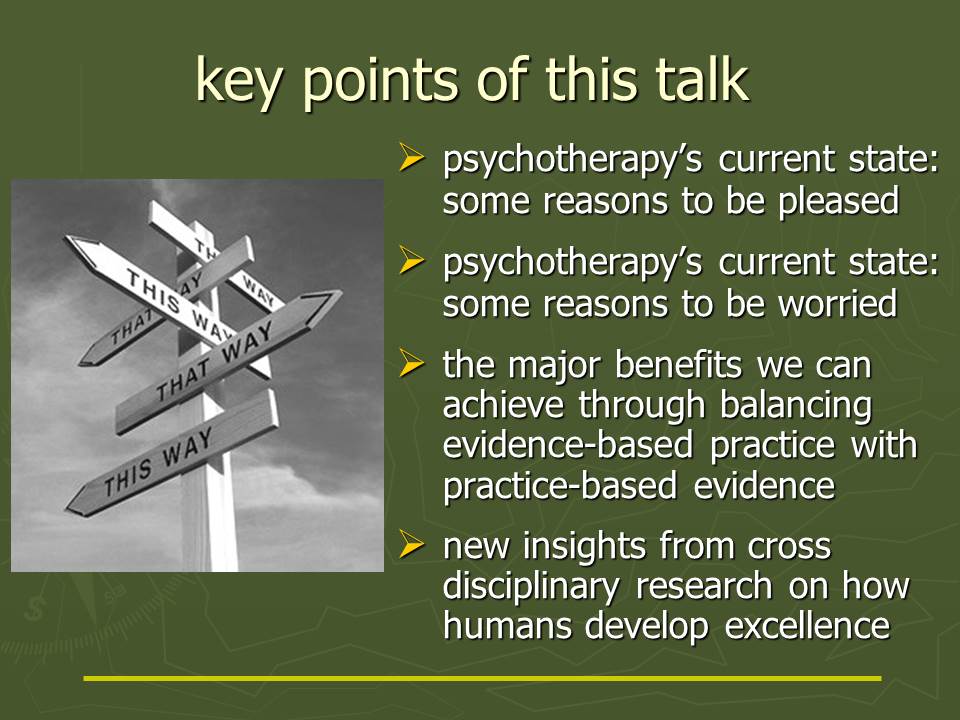Melbourne lecture: "How can we help our clients more effectively?" - encouraging benefits from using sessional feedback
Last updated on 28th August 2014
(the full 48 slide Powerpoint lecture can be downloaded by clicking here)

(the full 48 slide Powerpoint lecture can be downloaded by clicking here)
(the full 48 slide Powerpoint lecture can be downloaded by clicking here)
I gave a lecture in Melbourne today entitled "How can we help our clients more effectively?" An initial slide highlighted the main points I covered:

I wrote a blog post yesterday entitled "Therapeutic alliance ruptures: common, very challenging & a key area for increasing therapist (and personal) helpfulness". I think this area is so important that I'd like to spend additional time exploring it more thoroughly.
We had another of our small peer Emotion-Focused Therapy supervision/practice groups yesterday evening. Half a dozen of us were able to make it. We'd agreed we would look particularly at "therapeutic alliance ruptures" at this meeting. As a doctor, I can't help finding the term "alliance rupture" rather giggle-inducing. I have all kinds of pictures of unwanted extrusions, metaphorical trusses and possibly extreme interpersonal surgical cures.
A few months ago I wrote a series of three blog posts on the theme "New research suggests CBT depression treatment is more effective if we focus on strengths rather than weaknesses".
Yesterday was my second full day here in Amsterdam at the "Achieving Clinical Excellence" conference put on by the International Center for Clinical Excellence. The first full day had been a workshop with Scott Miller on "Feedback informed treatment: pushing your clinical effectiveness to the next level". This second day was the start of the conference proper and was entitled "Excellence: what do we know and what can we learn?". I walked in from my hotel thinking that I'd be hard pushed to come up with a day of lectures that would interest me more than this exploration of what makes for clinical excellence.
On Wednesday evening I flew into Amsterdam Schiphol airport for three days of workshop & conference on feedback systems & the development of excellence in psychotherapy. What a fascinating subject area to explore. What a treat. From the airport I caught a train to Amsterdam Zuid and then walked up through the sunny streets to my hotel. They were short of rooms and upgraded me to the 6th floor ... two walls of windows and a view to die for. A good start!
"Those who do not have the power over the story that dominates their lives - the power to retell it, reexperience it, deconstruct it, joke about it, and change it as times change - truly are powerless because they cannot think new thoughts." Salman Rushdie
I was talking to an old friend recently and I remarked on how well he was looking. He said he had lost two stone in weight and his waist circumference had gone down from 42 to 34 inches. Wow! I was very interested to hear how he had done it and he very kindly agreed to write his story:
A Wake-up Call
Salman Rushdie "Those who do not have the power over the story that dominates their lives - the power to retell it, re-experience it, deconstruct it, joke about it, and change it as times change - truly are powerless because they cannot think new thoughts."
I wrote an initial blog post yesterday on this month's new NICE guideline on "Social anxiety disorder: recognition, assessment and treatment". In today's post I would like to focus more on the guideline's very interesting treatment recommendations.
Fascinatingly this NICE guidance comes down fair & square on the side of one-to-one cognitive therapy as the first line treatment for social anxiety disorder. So the authors write:
1.3.2 Offer adults with social anxiety disorder individual cognitive behavioural therapy (CBT) that has been specifically developed to treat social anxiety disorder (based on the Clark and Wells model or the Heimberg model; see recommendations 1.3.13 and 1.3.14).